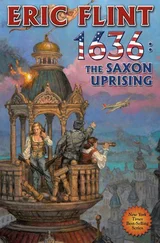Eric Flint - In the Heart of Darkness
Здесь есть возможность читать онлайн «Eric Flint - In the Heart of Darkness» весь текст электронной книги совершенно бесплатно (целиком полную версию без сокращений). В некоторых случаях можно слушать аудио, скачать через торрент в формате fb2 и присутствует краткое содержание. Жанр: Альтернативная история, на английском языке. Описание произведения, (предисловие) а так же отзывы посетителей доступны на портале библиотеки ЛибКат.
- Название:In the Heart of Darkness
- Автор:
- Жанр:
- Год:неизвестен
- ISBN:нет данных
- Рейтинг книги:3 / 5. Голосов: 1
-
Избранное:Добавить в избранное
- Отзывы:
-
Ваша оценка:
- 60
- 1
- 2
- 3
- 4
- 5
In the Heart of Darkness: краткое содержание, описание и аннотация
Предлагаем к чтению аннотацию, описание, краткое содержание или предисловие (зависит от того, что написал сам автор книги «In the Heart of Darkness»). Если вы не нашли необходимую информацию о книге — напишите в комментариях, мы постараемся отыскать её.
In the Heart of Darkness — читать онлайн бесплатно полную книгу (весь текст) целиком
Ниже представлен текст книги, разбитый по страницам. Система сохранения места последней прочитанной страницы, позволяет с удобством читать онлайн бесплатно книгу «In the Heart of Darkness», без необходимости каждый раз заново искать на чём Вы остановились. Поставьте закладку, и сможете в любой момент перейти на страницу, на которой закончили чтение.
Интервал:
Закладка:

Eric Flint, David Drake
In the Heart of Darkness
Prologue
When the lavish dinner was finished, and the servants sent away, the spymaster broke the bad news.
"Belisarius is alive," he said curtly.
There were seven other men in the room. One, like the spymaster, was foreign. From the blankness of his face, it was obvious he had already heard the news. Of the Romans in the room, five rose up on their couches, their faces expressing various degrees of consternation.
The seventh man, the last of the Romans, simply curled his lip, and satisfied himself with shifting his weight to the other elbow.
He had been disgusted the entire evening.
The two churchmen in the room disgusted him with their sanctimonious prattle. Glycerius of Chalcedon and George Barsymes were deacons, acting on behalf of Rufinus Namatianus, Bishop of Ravenna. They were rabidly orthodox. But, at bottom, their orthodoxy was nothing but a veil for ambition. The Bishop of Ravenna sought the papacy, and his underlings sought the patriarchates of Constantinople and Alexandria.
Ambition was the seventh man's motive also, but he did not disguise it with false piety. (A ridiculous piety, to boot-allying with Hindu heathens against Christian heretics.) The seventh man counted many sins against his soul, mortal and venial alike. But hypocrisy was not among them.
The two noblemen in the room disgusted him with their swaggering braggadocio. Their names were Hypatius and Pompeius. They were brothers, the nephews of the former emperor Anastasius. By any formal dynastic criterion, they were the rightful heirs to the imperial throne. But Romans had never worshipped at the altar of heredity. Competence was the ultimate standard for wearing the purple. And if there were two more feckless creatures in the entire Roman empire, they were hiding themselves well.
The other high Roman official in the room disgusted him. John of Cappadocia, his name was, and he was Emperor Justinian's Praetorian Prefect. A ruthless and capable man, to be sure. But one whose rapaciousness and depravity were almost beyond belief. Murderer, thief, extortionist, torturer, rapist-all these things John of Cappadocia had been named. The names were all true.
The two Malwa spies in the room disgusted him-Balban the oily spymaster even more than Ajatasutra the assassin-partly for their false bonhomie and pretense of comradeship, but mostly for their claim of disinterested concern for the best interests of Rome, which no one but an idiot would believe for an instant. The seventh man was very far from being an idiot, and he took the Malwa air of innocence as an insult to his intelligence.
The seventh man was disgusted with himself. He was the Grand Chamberlain of the Roman Empire. He was one of the most valued and trusted advisers of Emperor Justinian, whom he planned to betray. He was the close personal friend of the Empress Theodora, whom he planned to murder. He would add the count of treason to his sins, and increase the counts of murder, and all for the sake of rising one small rung in power. He was a eunuch, and so could never aspire to the throne himself. But he could at least become the Grand Chamberlain of a feckless emperor, instead of a dynamic one, and thus be the real power in Rome.
The seventh man knew, with all the intelligence of a keen mind, that his ambition was stupidity incarnate. He was an old man. Even if he realized his ambition, he would probably not enjoy its exercise for more than a few years.
For that stupid, petty ambition, the seventh man risked the possibility of execution and the certainty of eternal damnation. He despised himself for that pettiness, and was disgusted by his own stupidity. But he could not do otherwise. For all that he prided himself on his iron self-control, the seventh man had never been able to control his ambition. Ambition rode the eunuch like lust rides a satyr. It had ridden him as far back as he could remember, since the days when other boys had taunted and beaten him for his castrated deformity.
But, above all, the seventh man was disgusted because the Malwa and the Roman reactionaries in the room had insisted on dining in the archaic tradition, instead of sitting on chairs at a table, as all sensible people did in the modern day. The seventh man's aged body had long since lost the suppleness to eat a meal half-reclined on a couch.
His name was Narses, and his back hurt.
The Indian spymaster's eyes had been fixed on Narses from the moment he made the announcement. Months ago, Balban had realized that the eunuch was by far the most formidable of his Roman allies-and the only one who was not, in any sense, a dupe. The churchmen were provincial bigots, the royal nephews were witless fops, and John of Cappadocia-for all his undoubted ability-was too besotted with his own vices to distinguish fact from fancy. But Narses understood the Malwa plot perfectly. He had agreed to join it simply because he was convinced he could foil the Malwa after he had taken the power in Rome.
Balban was not at all sure the eunuch was wrong in that estimate. Narses, in power, would make a vastly more dangerous enemy for the Malwa than Justinian. So Balban had long since begun planning for Narses' own assassination. But he was a methodical man, who knew the value of patience, and was willing to take one step ahead of the other. For the moment, the alliance with the eunuch was necessary.
And so-
"What is your reaction, Narses?" he asked. The Indian's Greek was fluent, if heavily accented.
The eunuch grimaced as he painfully levered himself to an upright posture on his couch.
"I told you it was a stupid idea," he growled. As always, Balban was struck by the sound of such a deep, rich, powerful voice coming from such a small and elderly man. A eunuch, to boot.
" It was not ," whined Hypatius. His brother's vigorous nod of agreement was intended to be firm and dignified. With his cosmetic-adorned and well-coiffed head bobbing back and forth on a scrawny neck, the nobleman resembled nothing so much as a doll shaken by a toddler.
The eunuch fixed muddy green eyes on the nephews. Against his bony face, surrounded by myriad wrinkles, the effect was utterly reptilian. Deadly, but cold-blooded. The brothers shrank from his gaze like mice.
Narses satisfied himself with that silent intimidation. Much as he was often tempted, Narses never insulted the brothers. One of them would be needed, in the future, for his puppet emperor. Either one, it did not matter. Whichever summoned up the courage to plot with Narses to murder the other first. So, as always, the eunuch maintained formal respect, and allowed his eyes alone to establish dominance.
"I told you all from the beginning that the plan was pathetic," he said. "If you want to assassinate a man like Belisarius, you had better use something other than common criminals."
Ajatasutra spoke, for the first time that evening. He was the Indian mission's chief agent. A specialist in direct action, a man of the streets and alleys, where Balban manipulated from the shadows. His Greek was also fluent, but, unlike Balban's, bore hardly a trace of an accent. Ajatasutra could-and often did-pass himself off as a Roman citizen from one of the more exotic, outlying provinces of the empire. A dark-complected Syrian, perhaps, or a half-breed Isaurian.
"It was a well-laid plan, according to the report," he murmured. His tone exuded calm, dispassionate assessment. "Belisarius was ambushed shortly after landing in Bharakuccha. At night, in darkness. While he was alone, without his cataphract bodyguards. By no less than eight dacoits. Seasoned killers, all of them."
Читать дальшеИнтервал:
Закладка:
Похожие книги на «In the Heart of Darkness»
Представляем Вашему вниманию похожие книги на «In the Heart of Darkness» списком для выбора. Мы отобрали схожую по названию и смыслу литературу в надежде предоставить читателям больше вариантов отыскать новые, интересные, ещё непрочитанные произведения.
Обсуждение, отзывы о книге «In the Heart of Darkness» и просто собственные мнения читателей. Оставьте ваши комментарии, напишите, что Вы думаете о произведении, его смысле или главных героях. Укажите что конкретно понравилось, а что нет, и почему Вы так считаете.











